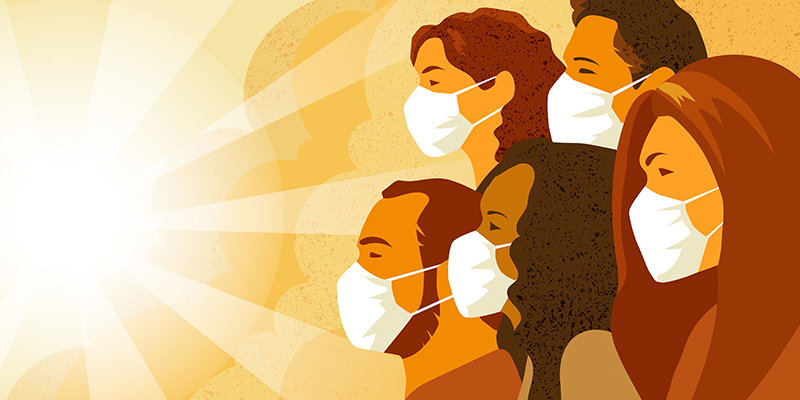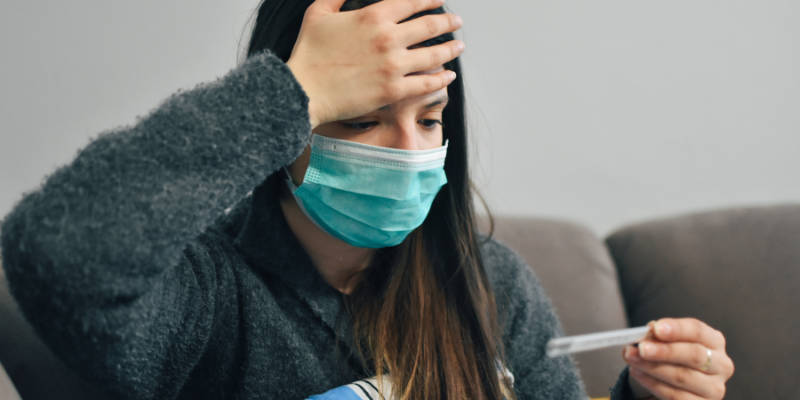
There’s no question that the past year has been unlike anything we have ever experienced before. We had to learn how to adapt quickly and do our individual parts to slow the spread of COVID-19 in an effort to protect those at risk as well as our loved ones and ourselves.
Think back to March 2020 when suddenly, we had to wear masks in public and wait in line to get into the grocery store while keeping our fingers crossed that there would still be some toilet paper on the shelves when it was our turn to go inside. The sparse availability of frozen vegetables, canned foods, and disinfecting products—let alone the dearth of critical supplies desperately needed for healthcare workers—gave all of us a front-row seat to the growing national emergency we were facing.
On top of this, social distancing requirements, stay-at-home orders, the closing of schools, daycare centers, restaurants, lodging, health clubs, and non-urgent doctor visits reshaped our world as we knew it.
Many people believed that within a few months, life would be back to normal, but as the spread of COVID-19 accelerated across the U.S. and around the world, things got worse instead of better. People were becoming more stressed and mental health problems were increasing. At times, life became too much for some and research showed the risk of suicide climbed.
Adjusting to the Next “New Normal”
Although each of us has had our own individual experience of the past year, to a large degree, we were all in this together, muddling our way through the frequently shifting changes that were required of us.
It was not easy—that is for sure. But have you noticed that as time went on, not only did you adjust your behaviors to reflect the needs of the common good, but you have also actually gotten used to them? And now, with what looks to finally be a light at the end of the tunnel, that collective sigh of relief so many people have been waiting for is getting closer.
But… does this make you feel happy and energized? Or does it give you anxiety and make you feel stressed?
With what looks to be a light at the end of the tunnel, that collective sigh of relief so many people have been waiting for is getting closer. Some people are happy and energized about it, others are feeling anxious and stressed.Are You Stressed About Returning to Regular Life?
Just as we struggled to adjust to the restrictions of the pandemic, it’s likely that many people will not find it so easy to jump right back into the way things used to be. A few reasons for this are:
- While those who have been fully vaccinated might be embracing that extra layer of protection, there are many who either haven’t had the opportunity or don’t plan to get the vaccine. Since the contagious virus continues to spread and there are plenty of people who are at risk of getting it, they may still feel unsafe going to restaurants, social events, and other public gatherings—even while wearing a mask. Thus, feeling any pressure to do so will likely increase their concerns and anxiety.
So, if this applies to you, be sure you are eating a healthy, low-inflammatory diet, taking your supplements, and getting regular exercise to help manage your worries and keep your immune system strong.
- Working from home has been a bit of a curse for some, but a blessing for others. As staff is required to return to their offices in the coming months, some folks can’t wait for workplace camaraderie to resume—but not everyone is happy about it. The flexibility of working from home along with avoiding a commute has been very helpful for many individuals and families. Having to give that up is a big cause of stress for some people.
In addition, offices are well-known for spreading germs like colds and the flu. COVID-19 germs are of even greater concern right now. If you do have to go back to your office, it’s ok to wear a mask, even if others don’t. Washing your hands regularly and avoiding the all-too-common temptation to touch your face, can help lower your chances of getting sick.
- Mental health problems, such as anxiety, depression, substance abuse, and eating disorders have increased during the past year. Social distancing and staying at home allowed some people who are dealing with these conditions to keep them private. With restrictions being lifted and social distancing protocols changing, they may be feeling vulnerable and experiencing increased levels of shame or despair.
If you are struggling right now, it’s okay—and courageous—to reach out and get the help you need to work through and overcome your mental health issues.
Coming Out of Hibernation
While we have weathered the pandemic together, it’s important to recognize that people will come out of it in different ways and in their own time. Some are ready to be free of wearing a mask inside, but others are terrified of that idea. Likewise, some folks are looking forward to hugging, high-fiving, and shaking hands again, but some people are not. Your preference is okay—as is that of your family, friends, and neighbors—so being respectful of what others want and need is necessary to ease into the transition that is ahead of us.
Humans are remarkably resilient, and we will eventually get to whatever the post-pandemic normal is going to be. Even though some things might be different than before, it is likely the challenges of the past year have made us all a little stronger.
Anxiety, depression, substance abuse, and other mental health problems are treatable and shouldn’t wait.
At Amen Clinics, we’re here for you. We offer in-clinic brain scanning and appointments, as well as mental telehealth, remote clinical evaluations, and video therapy for adults, children, and couples. Find out more by speaking to a specialist today at 888-288-9834 or visit our contact page here.





I love the content of this article. Basically, we are unique individuals who might want to be mindful that others are, too!
Comment by Karen A. Gilley — June 9, 2021 @ 7:22 AM
Being accepting of others and their fears or feeling of freedom will continue to be important. Asking, “Is it ok to shake your hand or give you a hug?” “Do you mind if I take my mask off?” “I’m immuno-compromised, could you please wear a mask or stay a little further back?” Simple courteous questions can go a long way toward having positive interactions.
Comment by Pleas Williams — June 9, 2021 @ 8:17 AM
Pre-covid, I was a homebody given to sitting behind a book or a screen, venturing out to run errands or spend time with friends. It created discord with my non-ADD husband who is a get-up-and-go type. Covid gave cover for me to be my natural self. Now that things are opening up, I will be pressured to get out more than I want for keeping the peace in the home. We are both fully vaccinated and still wearing masks indoors except at home. We are already odd-balls in that respect in our community, as most around here are masks off, all the time. It will be interesting and likely stressful for me.
Comment by DIANE H TALBOT — June 9, 2021 @ 9:24 AM
I really look forward to getting these wonderful emails on a daily basis. I always love to read and/or listen to familiar material presented in a different way, because it widens my peripheral vision. Thank-you!
Comment by Dr. Carol Cole — June 9, 2021 @ 11:46 AM